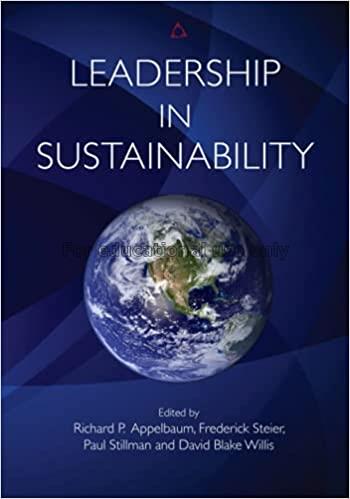Leadership in sustainability: perspectives on research policy, and practice / Richard P. Appelbaum
Author : Appelbaum, Richard P

This book offers a unique focus on the reciprocal relationship between leadership and sustainability in a turbulent world. It hopes to make the reader aware of how effective sustainable practices depend on leadership in a variety of ways. One key to its success is to understand how a system – whether in a community, an organization, an eco-system, or even a nation – can manage the delicate balance between social stability and change.The chapters in this volume address these issues in many different contexts – some from an organizational perspective, while others provide a cultural or national framework. What they have in common is an understanding of how sustainability and leadership might inform each other, particularly in a world where attention to both social and ecological justice is so critical. While much has been written about both leadership and sustainability individually, much less scholarship attention has been focused on the effort to bring the two concepts together in a holistic fashion. This volume engages that challenge in several ways. Chapter 1 sets the overall framework by presenting both the ecological and social issues that require leadership in business, government, NGOS, and education. Chapter 2 shows that we are at a critical tipping point in climate change, posing an existential threat that requires immediate action on the part of sustainability leaders in government and business. Chapter 3 extends this argument by examining unsustainable human practices involving animals, natural habitat destruction, and complex global networks. Chapters 4 through 7 address these concerns at the organizational level, providing case studies on sustainability leadership in action – leaders and organizations that try to “walk the talk.” Chapters 8 through 12 identify ways of thinking and new approaches that are needed today. These chapters argue that if sustainability leadership is to be effective, changes in psychology, consciousness, culture, and worldview are necessary. Finally, the Afterword makes connections between systems approaches and the very idea of “wicked” (or seemingly insurmountable) problems that leaders must face head-on.At the core of this book lies our recognition that we live in a participatory universe. In other words, when we speak about sustainability and sustainability leadership, we do so as participants in those worlds we are trying to sustain. We also recognize the value of others as participants in bringing about sustainability, and the unique perspectives that those with different ideological or political mindsets may bring to our quest
| Barcode | Call No. | Volume | Status | Due Date | Total Queue | |
|---|---|---|---|---|---|---|
| 1040012087 | SD00227 | Available | 0 | Please Login |
Related Book